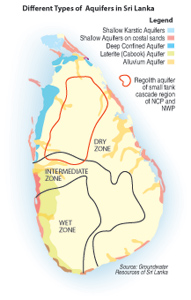News
Excessive use of agrochemicals pollutes groundwater in many places
View(s):Last month, the Sunday Times highlighted that Sri Lanka’s farmers were over-using agro-chemicals, and warned that it could ultimately penetrate into the groundwater. This has now been confirmed by a study conducted by the Water Resources Board (WRB).

WRB Director General R.S. Wijesekare revealed that chemical compounds such as Nitrates, Phosphates and heavy metals were found in excess in many places in the districts they surveyed. The survey covered Jaffna, Ampara, Puttalam, Anuradhapura, Matale and Gampaha districts. Excessive Nitrate compounds were in samples taken from Kalpitiya and Jaffna, while Phosphate was in abundance in samples taken in Ampara. In samples from Anuradhapura, heavy metals such as Arsenic were found in quantities exceeding standard levels, he confirmed.
Some of the agrochemicals will be absorbed by plants, but most of it will collect on the soil or be washed away as runoff. Part of it leaches through to the groundwater. What goes in will come out, so not only the people in the immediate vicinity, but others in the area too could be affected by contamination.
Water samples from 30 Secretariat Divisions covering these districts have been collected periodically, under this study initiated in 2011. Mr Wijesekare said that the results have highlighted the need for some control of using agro chemicals. He said that WRB with other agencies such as the Agriculture department and farmers are planning to conduct a program in Puttalam to educate farmers to use the Agrochemicals responsibly while monitoring the ground water periodically to check for improvements of the quality. He also said the survey has been done on a Pilot scale and are trying to do the exercise covering the whole island.
Head of Sri Lanka programme of International Water Management Institute (IWMI), Dr Herath Manthreetilake has also stressed the importance of having such programmes at least in priority areas prone to groundwater pollution.

He also pointed out that periodic monitoring has to be continuous, to get a clear idea of pollution levels. Isolated incidents of chemical spills on depleted groundwater reserves due to drought, can increase the concentration of chemicals, so the results may not be entirely accurate – but data captured periodically on the groundwater condition can give a better picture. Dr Manthreetilake said that groundwater in most industrial countries such as Japan, are polluted beyond usage. Therefore, to avoid falling into the same trap, it is important to continue with a proper monitoring mechanism of groundwater sources.
comments powered by Disqus
